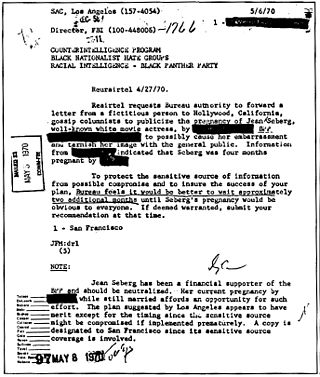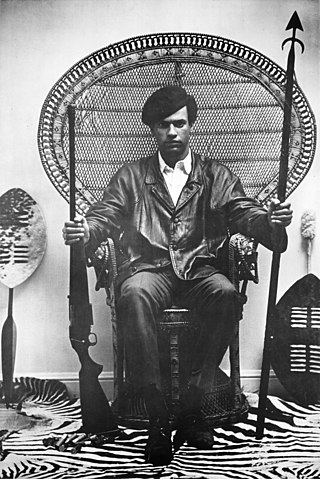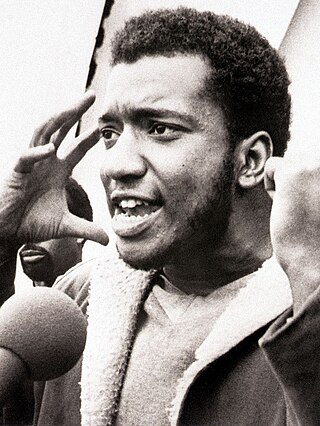
COINTELPRO was a series of covert and illegal projects conducted between 1956 and 1971 by the United States Federal Bureau of Investigation (FBI) aimed at surveilling, infiltrating, discrediting, and disrupting American political organizations that the FBI perceived as subversive. Groups and individuals targeted by the FBI included feminist organizations, the Communist Party USA, anti–Vietnam War organizers, activists in the civil rights and Black power movements, environmentalist and animal rights organizations, the American Indian Movement (AIM), Chicano and Mexican-American groups like the Brown Berets and the United Farm Workers, independence movements, a variety of organizations that were part of the broader New Left, and white supremacist groups such as the Ku Klux Klan and the National States' Rights Party.

The civil rights movement was a social movement and campaign from 1954 to 1968 in the United States to abolish legalized racial segregation, discrimination, and disenfranchisement in the country. The movement had its origins in the Reconstruction era during the late 19th century and had its modern roots in the 1940s, although the movement made its largest legislative gains in the 1960s after years of direct actions and grassroots protests. The social movement's major nonviolent resistance and civil disobedience campaigns eventually secured new protections in federal law for the civil rights of all Americans.

Robert George Seale is an American political activist and author. Seale is widely known for co-founding the Black Panther Party with fellow activist Huey P. Newton. Founded as the "Black Panther Party for Self-Defense", the Party's main practice was monitoring police activities and challenging police brutality in Black communities, first in Oakland, California, and later in cities throughout the United States.

Huey Percy Newton was an African American revolutionary and political activist who founded the Black Panther Party. He ran the party as its first leader and crafted its ten-point manifesto with Bobby Seale in 1966.

Fredrick Allen Hampton Sr. was an American activist. He came to prominence in his late teens and very early 20s in Chicago as deputy chairman of the national Black Panther Party and chair of the Illinois chapter. As a progressive African American, he founded the anti-racist, anti-classist Rainbow Coalition, a prominent multicultural political organization that initially included the Black Panthers, Young Patriots, and the Young Lords, and an alliance among major Chicago street gangs to help them end infighting and work for social change. A Marxist–Leninist, Hampton considered fascism the greatest threat, saying "nothing is more important than stopping fascism, because fascism will stop us all."

Robert Franklin Williams was an American civil rights leader and author best known for serving as president of the Monroe, North Carolina chapter of the NAACP in the 1950s and into 1961. He succeeded in integrating the local public library and swimming pool in Monroe. At a time of high racial tension and official abuses, Williams promoted armed Black self-defense in the United States. In addition, he helped gain support for gubernatorial pardons in 1959 for two young African-American boys who had received lengthy reformatory sentences in what was known as the Kissing Case of 1958.

The black power movement or black liberation movement was a branch or counterculture within the civil rights movement of the United States, reacting against its more moderate, mainstream, or incremental tendencies and motivated by a desire for safety and self-sufficiency that was not available inside redlined African American neighborhoods. Black power activists founded black-owned bookstores, food cooperatives, farms, media, printing presses, schools, clinics and ambulance services.

Alprentice "Bunchy" Carter was an American activist. Carter is credited as a founding member of the Southern California chapter of the Black Panther Party. Carter was shot and killed by a rival group, Ron Karenga's "Us", and is celebrated by his supporters as a martyr in the Black Power movement in the United States. Carter is portrayed by Gaius Charles in the 2015 TV series Aquarius.
Timothy B. Tyson is an American writer and historian who specializes in the issues of culture, religion, and race associated with the Civil Rights Movement. He is a senior research scholar at the Center for Documentary Studies at Duke University and an adjunct professor of American Studies at the University of North Carolina.

Various American fugitives in Cuba have found political asylum in Cuba after participating in militant activities in the Black power movement or the Independence movement in Puerto Rico. Other fugitives in Cuba include defected CIA agents and others. The Cuban government formed formal ties with the Black Panther Party in the 1960s, and many fugitive Black Panthers would find political asylum in Cuba, but after their activism was seen being repressed in Cuba many became disillusioned. House Concurrent Resolution 254, passed in 1998, put the number at 90. One estimate, c. 2000, put the number at approximately 100.
Radio Free Dixie was a radio program broadcast from Cuba by American Civil Rights Leader Robert F. Williams in the early 1960s that advocated for racial equality. It called on black Americans to rise up against what Williams saw as an inherently racist system. The radio program featured music, political conversation, and storytelling.
The Ten-Point Program or The Black Panther Party for Self-Defense Ten-Point Platform and Program is a party platform written by Huey P. Newton and Bobby Seale in 1966 for the Black Panther Party.

The Black Panther Party was a Marxist–Leninist and black power political organization founded by college students Bobby Seale and Huey P. Newton in October 1966 in Oakland, California. The party was active in the United States between 1966 and 1982, with chapters in many major American cities, including San Francisco, New York City, Chicago, Los Angeles, Seattle, and Philadelphia. They were also active in many prisons and had international chapters in the United Kingdom and Algeria. Upon its inception, the party's core practice was its open carry patrols ("copwatching") designed to challenge the excessive force and misconduct of the Oakland Police Department. From 1969 onward, the party created social programs, including the Free Breakfast for Children Programs, education programs, and community health clinics. The Black Panther Party advocated for class struggle, claiming to represent the proletarian vanguard.

Revolutionary Suicide is an autobiography written by Huey P. Newton with assistance from J. Herman Blake originally published in 1973. Newton was a major figure in the American black liberation movement and in the wider 1960s counterculture. He was a co-founder and leader of what was then known as the Black Panther Party (BPP) for Self-Defence with Bobby Seale. The chief ideologue and strategist of the BPP, Newton taught himself how to read during his last year of high school, which led to his enrollment in Merrit College in Oakland in 1966; the same year he formed the BPP. The Party urged members to challenge the status quo with armed patrols of the impoverished streets of Oakland, and to form coalitions with other oppressed groups. The party spread across America and internationally as well, forming coalitions with the Vietnamese, Chinese, and Cubans. This autobiography is an important work that combines political manifesto and political philosophy along with the life story of a young African American revolutionary. The book was not universally well received but has had a lasting influence on the black civil rights movement.

The Huey P. Newton Gun Club is a group named after Black Panther Party co-founder and Minister of Defense Huey P. Newton.
The Black Riders Liberation Party (BRLP) is a revolutionary black power organization based in the United States. The group claims ideological continuity with the original Black Panther Party for Self-Defense and, according to its official website, organizes gang members to "stop commiting [sic] genocide against each other and to stand up against white supremacy and capitalist oppression."
Negroes with Guns: Rob Williams and Black Power is a 2004 feature film by directors Sandra Dickson and Churchill Roberts. It was a National PBS Broadcast, on Independent Lens, in February 2006. The film won the 2006 Erik Barnouw Award for Outstanding Historical Documentary, of the Organization of American Historians, the Audience Award of the Detroit Docs Film Festival, in 2005, and the Critic's Award for Outstanding Feature Documentary of the New York UrbanWorld Film Festival, in 2005.

Seize The Time: The Story of The Black Panther Party and Huey P. Newton is a 1970 book by political activist Bobby Seale. It was recorded in San Francisco County Jail between November 1969 and March 1970, by Arthur Goldberg, a reporter for the San Francisco Bay Guardian. An advocacy book on the cause and principles of the Black Panther Party, Seize The Time is considered a staple in Black Power literature.
Robert "Bob" Mants, Jr. was an American civil rights activist, serving as a field secretary for the Student Nonviolent Coordinating Committee (SNCC). Mants moved to Lowndes County, working for civil rights for the remainder of his life. Lowndes County contained the majority of the distance covered by the 1965 Selma to Montgomery march, and was then notorious for its racist violence.
The Lowndes County Freedom Organization (LCFO), also known as the Lowndes County Freedom Party (LCFP) or Black Panther party, was an American political party founded during 1965 in Lowndes County, Alabama. The independent third party was formed by local African-American citizens led by John Hulett, and by staff members of the Student Nonviolent Coordinating Committee (SNCC) under the leadership of Stokely Carmichael.













